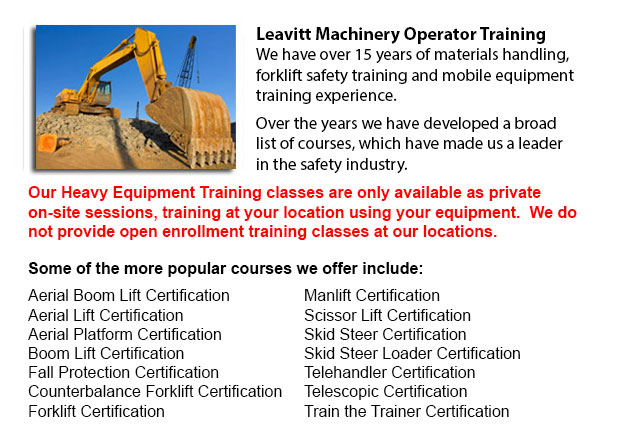
Vancouver Heavy Equipment Training Courses - When selecting a heavy equipment operator course, the first step must be to figure out the capacity in which you would be working with heavy machines. You could find the correct course to teach you how to operate the equipment or to fix these machinery. Numerous choices are available, be sure to align your career objectives and your research so you could figure out what classes will be best for you. It is vital to choose classes that are recognized and approved by the local governing bodies within your area.
There are plenty of certification kinds around. Some training is specific to the particular kind of heavy machine you would like to operate. Like for example, crane operator certification would need different heavy machinery classes than those found in forklift certification. Crane certification will allow you to safely operate a crane, whilst the latter will allow you to handle various kinds of materials handling machines. It is a great idea to check with your current employer before enrolling in any classes to make sure that the ones you choose will complete the training needs your employer has planned for you.
Heavy Equipment Operator Training
HEO or also known as the heavy equipment operator courses would provide you with the skills and knowledge required in order to enter the workforce as an entry level heavy machine operator. In this twelve week course in addition to a practicum, you will focus on jobsite fundamentals like for instance: environmental, safety and health training and awareness, machine operation and maintenance, and use of earth moving methods in hands-on situations.
Operator training would help people work with their selected heavy machine like for example a grader, loader, compactor, an excavator and a dozer. The essential skills which an operator will require to work with heavy machinery consists of: good oral communication skills, excellent problem solving skills, good spatial ability and excellent vision, physical strength and stamina, the ability to work alone or well with others in a team and good eye-hand coordination along with excellent manual dexterity.
Technical skills are also required to operate these equipment. These skills consist of: general mechanical ability, being able to operate equipment and power tools, understanding of safe working procedures, the ability to follow technical specifications, grade plans and read directions, the ability to make basic measurements and mathematical calculations, and the ability to carry out basic mechanical repairs and maintenance.
-
Telehandler and Zoom Boom Certification in Vancouver
Telescopic handlers usually referred to as telehandlers for short, are an extremely popular piece of heavy construction equipment. They are usually used in the construction and agricultural industries. These equipments have maximum reaching capabilit... More -
Vancouver Telehandler Ticket
Vancouver Telehandler Ticket - A telescopic handler or telehandler is a machine which is commonly utilized in industrial and agricultural applications. It has the same look to a lift truck and even functions in a similar way, although, the telehandle... More -
Vancouver Crane Operator Classes
Vancouver Crane Operator Classes - For the operators and the supervisors, current and new, the crane operator training course is suitable for all. Course content includes relevant federal, provincial and state safety regulations. The first component... More -
Vancouver Crane Training School
Vancouver Crane Training School - The crane training school offers industry-relevant programs. Courses provide trainees with learning results that match existing industry demands. Our small class sizes combine hands-on experience and theory. Our qual... More -
Vancouver Aerial Boom Lift Training
Vancouver Aerial Boom Lift Training - Aerial Boom Lift Training is needed for any individual who supervises, operates or works in the vicinity of boom lifts. This particular type of aerial lift or aerial work platform is for lifting individuals, tool... More -
Narrow Aisle Forklift - Order Picker Training - Electric Pallet Jack - Electric Pallet Truck Certification in Vancouver
A pallet jack is a piece of equipment dedicated in the maneuvering of pallets of many dimensions and weights. They can be used as an attachment for forklifts, cranes and other variations of heavy machinery or be applied on their own. Pallet lifts are... More -
Vancouver Telehandler Operator Training
Vancouver Telehandler Operator Training - Telescopic handler Forklifts or telehandler forklifts are common industrial machines found in numerous construction industry environment. The telehandler is a helpful machine and makes for a valuable device t... More -
Vancouver Manlift Ticket
Vancouver Manlift Ticket - The Manlifts and Elevated Platforms course provides training on the regulations, rules and proper application of safe operating procedures and work practices involved in daily activities for individuals who work with this m... More

Forklift Certification Vancouver
TOLL FREE: 1-888-254-6157
51 Leeder Street
Coquitlam, British Columbia
forkliftcertificationvancouver.com/
Email Us
About Us



